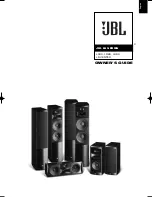
SHORTING STRAPS
The S4800 is shipped with shorting
straps installed between its low-
frequency and high-frequency
terminals. Please see Figure 8.
To prepare the S4800 for bi-wire
operation, these straps must be
removed by completely unscrewing
each binding-post knob, removing
the straps, and replacing the knob.
Speaker wires can then be con-
nected to each set of terminals
(see Figure 9).
AMPLIFIER
CONNECTIONS
IMPORTANT:
Turn all amplifiers off
before connecting or disconnect-
ing S4800 loudspeakers. Making
connections while an amplifier is
operating could seriously damage
the loudspeaker system and void
the warranty. All amplifiers must
also be turned off before connect-
ing or disconnecting cables at the
amplifier or preamplifier inputs.
All connections between the amp-
lifier(s) and the S4800 loudspeaker
system are made at the terminals
located on the back of the enclo-
sure (see Figures 9 through 12).
The left-hand terminals (black
stripe) are negative, and the right-
hand terminals (red stripe) are
positive. These correspond to the
negative and positive conductors
in the speaker wire. Each speaker
wire contains two conductors, one
of which will have a stripe, color
markings or a ridge. Assign one of
the two conductors as the nega-
tive conductor and the other as
the positive conductor. Use these
same designations for all system
wiring. Always connect the con-
ductors of the speaker wire appro-
priately to the corresponding neg-
ative and positive terminals on all
system components. This will
ensure that all components will
work together (“in phase”). Con-
necting the speakers out of phase
will not damage them but will
result in reduced low-frequency
output and impaired stereo effect.
Speaker wires may be fastened to
the terminals by several methods.
The most positive connection is
made by directly connecting clean,
bare connectors (exposed by strip-
ping the ends of the wire) to the
terminal posts.
For this type of connection, loosen
the knobs on the terminals and
insert the exposed (bare) ends of
each speaker wire into the hole
exposed on the terminal shaft
( + to +, – to – ) (see Figure 12).
Refasten the knob on each termi-
nal so that a snug connection is
achieved. Do not apply excessive
force and do not overtighten. To
avoid a short circuit, trim off any
excess wire that is not in contact
with the binding post contact
surfaces.
S4800 terminals are also designed
to accept spade or banana-type
connectors, which are fastened to
the ends of the wires and, in turn,
are attached to the terminal posts.
WIRING
CONFIGURATIONS
As mentioned earlier, the S4800
speakers may be connected to the
amplifier(s) by one of these meth-
ods: passive or bi-wire. Each
method (described on page 13)
has its own advantages, and the
loudspeaker system will deliver
superb performance with both
methods.
Each speaker is shipped with
external shorting straps in place
(see Figure 8), connecting the
upper and lower terminal posts
on the left and right sides. These
straps must remain in place for
passive connections but must be
removed for all bi-wire connec-
tions.
IMPORTANT:
If the amplifiers are
connected to the S4800 loudspeak-
ers in the bi-wire mode with the
shorting straps still on, the amplifi-
er outputs will be shorted, which
could result in costly amplifier
damage when the power is
switched on.
12
Mod
el S4
800
HF
- U
HF
HF
- TR
IM
LF
INP
UT
JBL
Inco
rpor
ated
, No
rthri
dge
, Ca
lifor
nia
USA
+1d
B
+0d
B
–1d
B
––
Figure 9.
Removing shorting straps.
(Bi-Wire Connection Method)
S4800 OM 10/11/05 1:51 PM Page 12






































